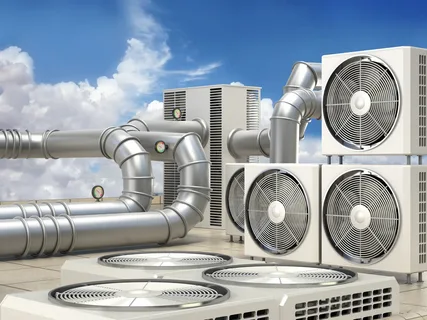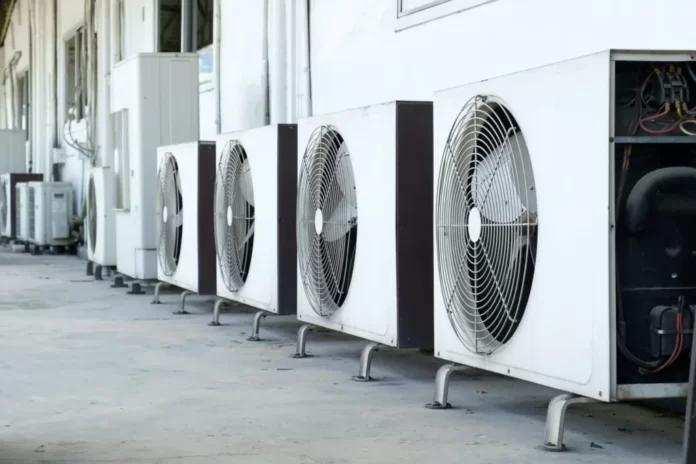Are you concerned about your family or employees’ health and safety? If so, you must invest in a quality heating system to help avoid mould and moisture issues. A reliable HVAC system is essential for maintaining a healthy indoor air environment. In this blog post, we’ll discuss why a quality heating and ventilation system is necessary, how it can help prevent mould and moisture issues, and what to look for when shopping for one.
Understanding the Importance Of Air Quality
Air quality plays a crucial role in our overall health and well-being. Poor indoor air quality can lead to various health issues, including respiratory problems, allergies, and even more severe conditions like asthma. When we think of air pollution, we often imagine outdoor pollution caused by vehicles or industrial emissions. However, studies have shown that indoor air can be even more polluted than outdoor air.
It is where a quality heating system comes into play. HVAC systems help maintain a comfortable temperature and circulate and filter the air. By continuously exchanging indoor and outdoor air, these systems help remove pollutants, allergens, and other contaminants, ensuring cleaner and healthier indoor air.
In addition to the health benefits, good air quality also contributes to increased productivity and overall well-being. Poor air quality can lead to fatigue, decreased focus, and increased sick leave. On the other hand, clean and fresh air can improve cognitive function, boost energy levels, and enhance overall performance.
Investing in a quality heating system is essential for creating a safe and healthy indoor environment for your family or employees. By understanding the importance of air quality, you can make an informed decision and prioritize the well-being of those who rely on you.
The Dangers Of Mould And Moisture
Excessive moisture and mould growth in your home or workplace can pose serious health risks. Mould thrives in damp environments, and when left untreated, it can spread quickly and release harmful spores into the air. Breathing in these spores can trigger allergic reactions, worsen respiratory conditions, and even lead to infections in individuals with weakened immune systems.
One of the main dangers of mould is its potential to cause allergic reactions. Common symptoms include sneezing, coughing, itching, and watery eyes. For individuals with asthma or other respiratory conditions, mould exposure can exacerbate their symptoms and lead to severe breathing difficulties.
Mould can also release mycotoxins, which are toxic substances that can have serious health effects. Prolonged exposure to mycotoxins can cause neurological problems, such as memory loss and difficulty concentrating. It can also affect the immune system, increasing susceptibility to infections.
In addition to the health risks, mould growth can cause structural damage to your property. It can weaken the walls, ceilings, and floors and lead to costly repairs and renovations.
Investing in a quality heating system can effectively control the moisture levels in your indoor environment and prevent mould growth. These systems help regulate humidity levels and improve air circulation, creating an inhospitable environment for mould to thrive.
To ensure the safety and well-being of your family or employees, promptly addressing any moisture or mould issues is crucial. A quality heating system can help mitigate the dangers of mould and moisture, creating a healthier and safer living or working environment.
Benefits Of A Heating And Ventilation Unit
A quality heating and ventilation unit offers numerous benefits for both residential and commercial settings.
Firstly, a heating unit helps to regulate and maintain a comfortable temperature throughout the year. Whether it’s cold winter or hot summer days, the system ensures that the indoor environment remains cozy and pleasant, enhancing the overall comfort of occupants.
Furthermore, these systems improve indoor air quality by constantly circulating and filtering the air. They remove airborne particles, allergens, and pollutants, which helps reduce the risk of respiratory problems and allergies. It is particularly important for individuals with asthma or other respiratory conditions.
A heating system also helps to control and regulate humidity levels. Excessive moisture in the air can lead to mould growth and dampness issues. By maintaining optimal humidity levels, the system helps prevent mould, mildew, and rot, protecting the structure and integrity of the building.
In addition, a well-functioning heating unit can save energy and reduce utility costs. Energy-efficient models can heat or cool a space, using less energy and minimizing waste. It benefits the environment and reduces the financial burden of high energy bills.
Overall, investing in a quality heating system offers numerous advantages, including improved comfort, enhanced air quality, moisture control, energy savings, and protection against mould and moisture issues. It is essential for creating a healthy and safe indoor environment for residential and commercial spaces.
Factors To Consider When Choosing A System For Heating And Ventilation
When choosing a system for heating and ventilation, several factors must be considered to ensure you select the right system for your needs.
Firstly, consider the space size you need to heat and ventilate. A system that is too small will need help to adequately heat or cool the area, while a system that is too large will save energy and result in higher utility bills. It’s important to accurately measure the square footage of the space and consult with HVAC professionals to determine the appropriate system size.
Another important factor to consider is energy efficiency. Look for systems with high Energy Star ratings that minimize energy consumption and reduce greenhouse gas emissions. Energy-efficient systems can save money in the long run and are better for the environment.
It would help if you also considered the noise level of the system. Some HVAC units can be loud and disruptive in residential settings or offices where quiet is essential. Look for systems that have noise-reduction features to ensure a peaceful and comfortable environment.
Additionally, consider the system’s features and controls. Modern HVAC systems come with various features, such as programmable thermostats, remote control options, and smart home integration. These features can enhance convenience and allow you to control and adjust the system according to your preferences easily.
Lastly, it’s crucial to consider your budget. Heating systems vary in price, and it’s important to find a system that fits your budget while still meeting your needs. However, keep in mind that investing in a higher-quality system may offer better performance, energy savings, and durability in the long run.
By considering these factors when choosing a system for ventilation, you can make an informed decision and select a system that will provide optimal comfort, efficiency, and air quality for your space.
Maintenance And Care For Optimal Performance
Regular maintenance and care are essential to ensure optimal performance and longevity of your heating system. Here are some important steps to follow:
Regularly Clean And Replace Air Filters
Clogged or dirty air filters can restrict airflow and reduce the efficiency of your system. Check your filters every month and clean or replace them as needed. It will help improve air quality and prevent dust and debris from building up in your system.
Keep The System Clean
Dust and debris can accumulate on the various components of your heating system, affecting its performance. Regularly clean the vents, ducts, and outdoor unit to remove buildup. You can use a vacuum or a soft cloth to clean the vents and wipe down the outdoor unit with a damp cloth.
 Schedule Professional Maintenance
Schedule Professional Maintenance
It’s important to have your heating system professionally inspected and serviced at least once a year. A trained technician will check for any issues, clean the system thoroughly, and make any necessary repairs or adjustments to ensure optimal performance.
Monitor And Regulate Humidity Levels
Excessive moisture in the air can promote mould growth and damage your system. Use a humidistat or a hygrometer to monitor humidity levels in your space and adjust them accordingly. Consider installing a dehumidifier or humidifier to maintain optimal humidity levels.
Ensure Proper Ventilation
Proper airflow is crucial for the performance of your system. Ensure that furniture or other objects do not obstruct the vents and air registers. Keep the outdoor unit clear of debris and vegetation to allow for proper airflow.
Following these maintenance and care tips ensures that your heating system operates efficiently and effectively, providing you with a comfortable and healthy indoor environment. Remember, a well-maintained system will not only improve air quality but also save you money on energy bills and extend the lifespan of your equipment.
Choosing Reputable Heating And Ventilation Companies
When investing in a quality heating system, choosing reputable heating and ventilation companies that will provide reliable products and services is important. With so many options available, it can be overwhelming to narrow down the choices.
To ensure you’re working with a reputable ventilation company, here are a few things to consider:
- Experience and Expertise: Look for a company with years of industry experience and a team of knowledgeable professionals. A company that has been around for a while is likelier to have a track record of providing quality products and services.
- Reviews and Testimonials: Read customer reviews and testimonials to get an idea of other people’s experiences with the company. Positive reviews are a good indication of a company’s reputation and customer satisfaction.
- Certifications and Accreditations: Check if the company holds any certifications or accreditations from reputable organizations. It can signify their commitment to meeting industry standards and best practices.
- Licensing and Insurance: Ensure the company is properly licensed and insured. It protects you and the company in case of any accidents or damages during installation or maintenance.
- Warranty and Customer Support: Inquire about the warranty provided for the heating system. A reputable company will stand behind their products and offer warranties to provide peace of mind. Additionally, find out what kind of customer support they offer if you have any questions or issues with your system.
By taking the time to research and choose a reputable ventilation company, you can have confidence in the quality of their products and services, ensuring a reliable and efficient system for your indoor environment.
FAQs
1. How often should I clean or replace the air filters in my heating system?
It is recommended to clean or replace air filters every 1-3 months, depending on the manufacturer’s instructions and the usage level. Regularly cleaning or replacing air filters helps maintain optimal airflow and ensures the efficiency of your system.
2. Can a heating and ventilation system prevent mould growth completely?
While a quality heating and ventilation system can help control moisture levels and reduce the risk of mould growth, it cannot completely prevent mould in all circumstances. It is important to address any moisture issues promptly, such as leaks or condensation, and ensure proper ventilation to minimize the conditions favourable for mould growth.
3. How can I tell if my heating system needs professional maintenance?
Some signs that your heating system may need professional maintenance include reduced airflow, strange noises, unpleasant odours, frequent breakdowns, or higher energy bills. It is best to schedule regular professional inspections and maintenance to ensure the optimal performance of your system.
4. Can I install a heating system myself?
Installing a heating system can be complex and requires technical knowledge and expertise. Hiring a professional HVAC technician for installation is recommended to ensure the system is properly installed and functions efficiently and safely.
Conclusion
The cost of heating and ventilation systems can vary depending on various factors, including the space size, the type of system, and any additional features or accessories. It is best to consult with HVAC professionals who can assess your specific needs and provide accurate cost estimates for your desired system.
| Other Good Articles to Read |
| Blogs Rain |
| Cme Blog Spot |
| Garcias Blogs |
| Yyc Blogs |
| Guiade Blogs |
| Blogs-Hunt |
| Impact-Blog |
| Smarty Blogs |
| Ed Blog |
| Mo Blogs |
| Blogs Em |
| Blogs T |
| Business Listings in Australia |

